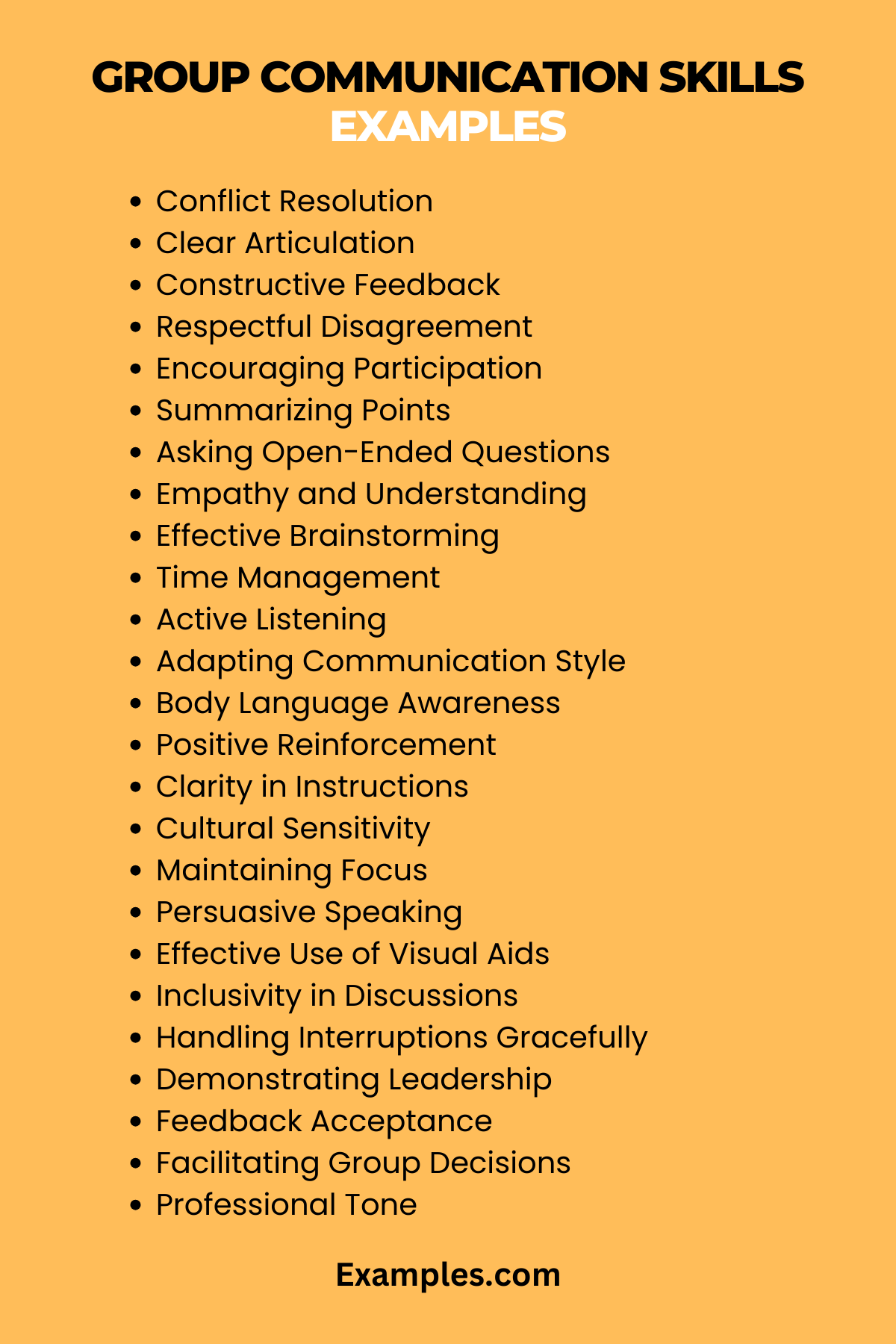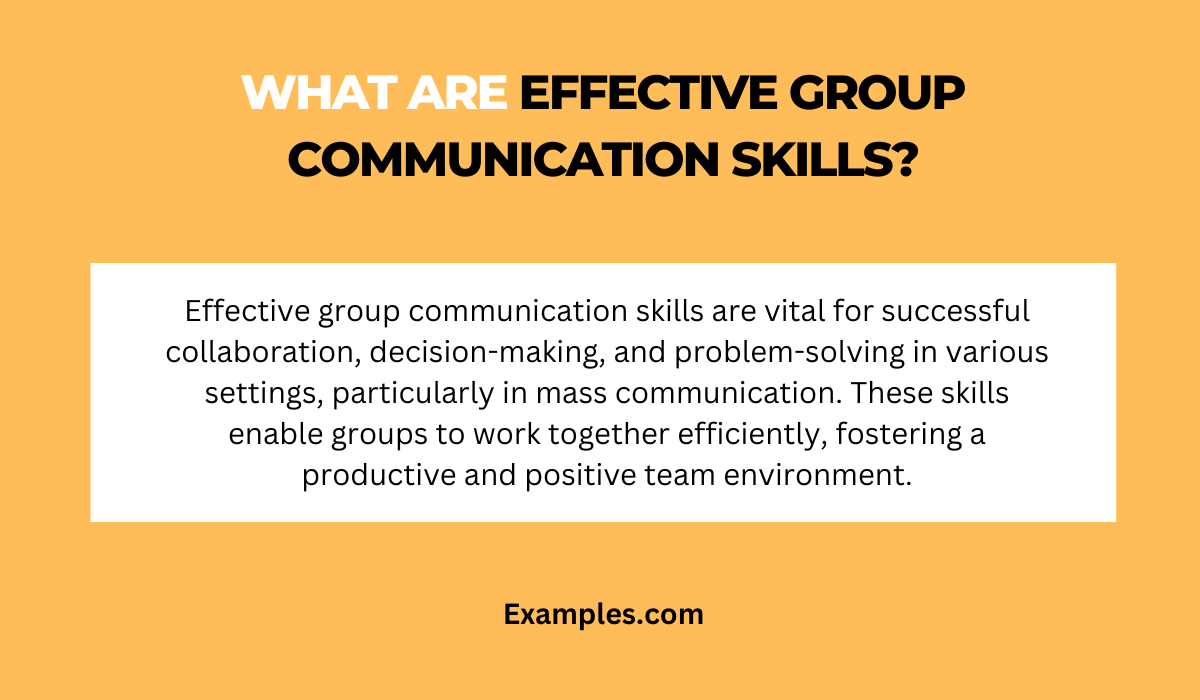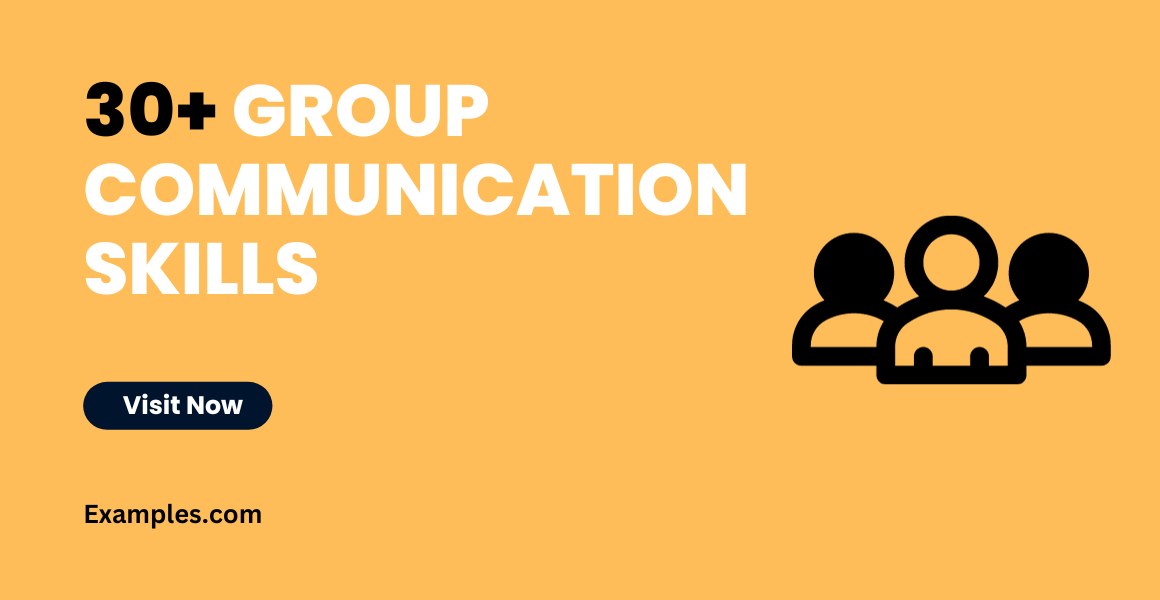29+ Group Communication Skills Examples
Mastering group communication skills is pivotal in today’s collaborative work environments. Effective group communication involves more than just conversing; it encompasses active listening, clear articulation, and constructive feedback within a team setting. These skills are essential for ensuring productive discussions, fostering team harmony, and achieving collective goals. Excelling in this aspect of communication skill can significantly enhance teamwork, drive successful project outcomes, and promote a positive and inclusive workplace culture.
30 Group Communication Skills Examples
Here are 30 essential group communication skills, each accompanied by a unique and distinct example to illustrate how they can be effectively utilized in group settings.

- Active Listening:
Truly listening to others’ ideas and opinions.
Example: “I see your point, Sarah. Can you elaborate on how this approach might benefit our project?” - Clear Articulation:
Expressing thoughts clearly and concisely.
Example: “To summarize, our main goal is to increase client engagement by 20% this quarter.” - Constructive Feedback:
Providing helpful and specific suggestions.
Example: “John, your report was very comprehensive. Perhaps adding more data analysis could make it even stronger.” - Respectful Disagreement:
Disagreeing without being confrontational.
Example: “I understand your perspective, but have we considered the potential risks involved?” - Encouraging Participation:
Inviting quieter members to share their thoughts.
Example: “Linda, you have a lot of experience in this area. We’d love to hear your thoughts.” - Summarizing Points:
Concisely summarizing what has been discussed.
Example: “So, what we’ve decided is to focus on digital marketing strategies first, correct?” - Asking Open-Ended Questions:
Encouraging broader discussion and ideas.
Example: “What are some innovative ways we can approach this challenge?” - Empathy and Understanding:
Showing consideration for others’ feelings and viewpoints.
Example: “I see that this deadline is causing stress. Let’s figure out a solution together.” - Effective Brainstorming:
Facilitating creative and open idea generation.
Example: “Let’s brainstorm some out-of-the-box solutions for this issue.”

- Time Management:
Keeping discussions on track and within time limits.
Example: “We have 10 minutes left, let’s prioritize the remaining agenda items.” - Conflict Resolution:
Addressing and resolving disagreements constructively.
Example: “Let’s find a middle ground that addresses both of our concerns.” - Adapting Communication Style:
Altering communication style to suit the group dynamic.
Example: “Since we are all from different departments, let’s start with a brief introduction about our roles.” - Body Language Awareness:
Using and interpreting non-verbal cues effectively.
Example: “I notice some hesitation, Mike. Do you have any concerns about the plan?” - Positive Reinforcement:
Acknowledging and appreciating others’ contributions.
Example: “Great idea, Anita! That approach could really increase efficiency.” - Clarity in Instructions:
Giving clear and understandable directions.
Example: “Please ensure your part of the project addresses these specific criteria.” - Cultural Sensitivity:
Being mindful of and respecting cultural differences.
Example: “I’m aware we have diverse cultural perspectives here, which is a great asset to our discussion.”

- Maintaining Focus:
Steering the conversation back to the main topic.
Example: “These points are valid, but let’s refocus on our initial goal.” - Persuasive Speaking:
Convincingly presenting ideas or arguments.
Example: “If we implement this strategy, we can expect a significant increase in ROI.” - Effective Use of Visual Aids:
Enhancing communication with appropriate visual materials.
Example: “This chart here clearly shows the trends we are discussing.” - Inclusivity in Discussions:
Ensuring all members feel included and valued.
Example: “I want to make sure we hear from everyone on this. Alex, what are your thoughts?” - Handling Interruptions Gracefully:
Managing and minimizing disruptions during discussions.
Example: “Let’s allow Jane to finish her point before we jump in with questions.” - Demonstrating Leadership:
Guiding and motivating the group effectively.
Example: “As a team, we have the talent to turn this challenge into an opportunity.” - Feedback Acceptance:
Being open to and learning from feedback.
Example: “I appreciate that feedback. It’ll help me improve my part of the project.” - Facilitating Group Decisions:
Leading the group towards consensus and decision-making.
Example: “Based on our discussion, it seems we’re leaning towards option B. Would everyone agree?”

- Professional Tone:
Maintaining a professional manner in communication.
Example: “Let’s discuss this matter with the professionalism it deserves.” - Storytelling for Engagement:
Using stories to make points more relatable and engaging.
Example: “This situation reminds me of a project last year where we faced a similar challenge.” - Active Inquiry:
Proactively seeking clarification and further information.
Example: “Could you elaborate on how this will impact our workflow?” - Effective Email Communication:
Writing clear and concise emails for group correspondence.
Example: “As discussed in our meeting, please find attached the revised project plan.” - Transparency and Honesty:
Being open and honest in all communications.
Example: “It’s important to be transparent about the challenges we’re facing with this project.” - Positive Attitude:
Maintaining a positive and constructive approach in discussions.
Example: “Despite the obstacles, I’m confident we can find a solution together.”
What are Effective Group Communication Skills?
Effective group communication skills are vital for successful collaboration, decision-making, and problem-solving in various settings, particularly in communication skills. These skills enable groups to work together efficiently, fostering a productive and positive team environment.

Active Listening
- Engaging with Ideas: Active listening involves paying full attention to the speaker, understanding their perspective, and responding thoughtfully. It’s essential for respecting different viewpoints and building consensus.
- Feedback Loop: Encourages open discussions and helps in clarifying and refining ideas, ensuring all group members are on the same page.
Clear and Respectful Expression
- Articulation of Thoughts: Clearly expressing ideas and thoughts is crucial for effective group communication. It ensures that the message is understood as intended.
- Respectful Dialogue: Maintaining respect in communication, even during disagreements, helps preserve a collaborative atmosphere.
Constructive Feedback
- Positive and Productive Criticism: Providing constructive feedback helps improve ideas and solutions. It’s essential to frame feedback in a positive, helpful manner.
- Receptiveness to Feedback: Being open to receiving feedback and acting on it is just as important for group dynamics and personal growth.
Conflict Resolution
- Navigating Disagreements: Effective group communication skills include the ability to handle conflicts. It involves understanding different perspectives and finding a mutually acceptable solution.
Consensus Building
- Negotiating and Compromising: Skills in negotiating and finding compromises are key for reaching agreements that satisfy all group members.
- Decision-Making Process: Facilitating a democratic and inclusive decision-making process ensures that every member’s input is valued.
Why are Communication Skills Important in a Group?
Communication skills are the foundation of any successful group interaction, especially in fields like communication skills. They play a critical role in ensuring that group objectives are met effectively and efficiently.
Enhancing Team Collaboration
- Unified Goals: Good communication helps align team members with shared goals and strategies, crucial for achieving desired outcomes.
- Team Synergy: Effective communication fosters a sense of unity and collaboration, making the team more than just the sum of its parts.
Boosting Productivity
- Streamlining Processes: Clear communication minimizes misunderstandings and streamlines work processes, leading to increased productivity.
- Problem-Solving: Open and honest communication is essential for brainstorming and problem-solving, enabling teams to tackle challenges creatively and effectively.
Building Trust and Morale
- Trust and Transparency: Consistent and open communication builds trust among team members, a key element for a strong and cohesive group.
- Positive Work Environment: Effective communication contributes to a positive work environment, enhancing job satisfaction and team morale.
Facilitating Innovation and Creativity
- Diverse Perspectives: Group communication brings together diverse perspectives, fostering innovation and creativity.
- Idea Generation and Refinement: Through effective communication, groups can generate and refine ideas, leading to more innovative solutions.
In conclusion, effective communication skills are indispensable in group settings. They not only facilitate smoother interactions but also contribute significantly to the success and productivity of teams, particularly in dynamic fields like communication skills.
What are the Benefits of Group Communication Skills?
In the dynamic field of communication skills, group communication skills play a crucial role. These skills not only enhance team collaboration but also contribute significantly to the success of various projects and initiatives.
Enhanced Team Collaboration
- Fosters Teamwork: Effective group communication encourages teamwork and collaboration. It ensures that all team members are on the same page, working towards common goals.
- Resolves Conflicts: Good communication is key to resolving conflicts in a team. It allows for open discussion, understanding different viewpoints, and finding mutually agreeable solutions.
Efficient Decision Making
- Streamlines Decision-Making Process: Clear and open communication enables faster and more effective decision-making. When everyone is heard, decisions are made with a comprehensive understanding of the situation.
- Encourages Diverse Perspectives: Group communication brings diverse perspectives to the table, leading to more creative and well-rounded decision-making.
Improved Project Management
- Clear Task Delegation: Effective communication ensures that tasks are clearly delegated and understood, leading to efficient project management.
- Enhances Problem-Solving: Teams with strong communication skills are better equipped to brainstorm solutions and tackle challenges creatively.
Builds Strong Workplace Relationships
- Promotes Trust and Respect: Consistent and respectful communication fosters trust among team members, which is crucial for a healthy workplace environment.
- Increases Employee Engagement: Teams that communicate effectively tend to have higher levels of employee engagement and satisfaction.
How to Improve Group Communication Skills?
Improving group communication skills is essential for a harmonious and productive work environment. Here are some strategies to enhance these skills:
Encourage Open Dialogue
- Create a Safe Environment: Establish a team culture where members feel safe to express their thoughts and opinions without fear of judgment or backlash.
- Promote Active Listening: Encourage team members to practice active listening, which involves fully concentrating, understanding, responding, and then remembering what is being said.
Develop Clear Communication Strategies
- Set Communication Standards: Establish clear guidelines for how the team will communicate, including the frequency, methods, and preferred platforms for different types of communication.
- Utilize Effective Tools: Make use of communication tools and software that facilitate group discussion and collaboration, especially important in remote or hybrid work environments.
Enhance Interpersonal Skills
- Build Empathy and Understanding: Foster an environment where team members strive to understand and empathize with one another.
- Manage Non-Verbal Cues: Train team members to be aware of and effectively use non-verbal communication like body language and facial expressions.
Practice Conflict Resolution
- Develop Conflict Resolution Skills: Equip team members with the skills to address and resolve conflicts constructively.
- Encourage a Solution-Focused Approach: Focus on finding solutions rather than dwelling on problems during team discussions and conflicts.
Continuous Learning and Feedback
- Organize Training Workshops: Regular workshops on communication skills can be highly beneficial.
- Implement Regular Feedback Mechanisms: Feedback should be a two-way street. Regularly review and assess the team’s communication effectiveness and make necessary adjustments.
In communication skills, as in many fields, group communication skills are essential for achieving objectives, maintaining a positive work environment, and driving team success. By fostering these skills, businesses can enhance collaboration, improve decision-making, and boost overall productivity.
Mastering group communication skills is vital for any collaborative environment, especially in communication skills. These skills enhance teamwork, streamline decision-making, and strengthen workplace relationships. By actively fostering open dialogue, clear communication strategies, empathy, and effective conflict resolution, teams can achieve greater harmony and efficiency. This guide underscores the importance and methods of honing these essential skills for success in any group setting.



